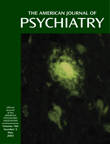Obstetric Complications and Schizophrenia
To the Editor: In a meta-analysis of prospective population-based studies, Mary Cannon, M.D., Ph.D., M.R.C.Psych., et al. (1) reported that three classes of complications were “significantly associated with schizophrenia: 1) complications of pregnancy (bleeding, diabetes, rhesus incompatibility, preeclampsia); 2) abnormal fetal growth and development: (low birth weight, congenital malformations, reduced head circumference), and 3) complications of delivery (uterine atony, asphyxia, emergency Cesarean section)” (p. 1080). Thus, there are no less than 10 factors of etiological significance for schizophrenia. But how could so diverse a list of factors all have the same effect? If any one were relevant, why would it not stand out, given proband versus healthy comparison groups of 1,923 and 527,925 births, respectively?
The authors wrote, “The findings from the population-based studies were mostly negative and surprisingly contradictory” (p. 1082) and recognized that case-control studies are not free from potential bias. One such bias in a previous study (2) that suggested eclampsia was a risk factor was detected and scrupulously corrected with negative conclusions by Kendell et al. (3). Failure to document blindness in case selection (4) was a feature of a study that suggested that asphyxia was relevant (5): for this putative risk factor, the meta-analysis detected significant heterogeneity of outcome between studies (Q=12.56, df=2, p=0.005). Yet in the case of each of these factors, Dr. Cannon et al. drew positive conclusions, in some cases calling on evidence, e.g., the meta-analysis of Geddes and Lawrie (6), that included studies that are clearly vulnerable to biases, e.g., maternal recall, in addition to those of case-control studies. The authors discussed pathophysiological theories (1, pp. 1083–1087) for each class of agent as though a causal relationship were established, although for any given factor, the majority of the studies included adequate and sometimes detailed records of the event in question and failed to detect an association.
The authors’ inability to draw the obvious conclusion that the etiology of psychosis is simply unrelated to complications of pregnancy and birth is reflected in the complaint that “lack of statistical power to measure small and interactive effects…are major problems with current approaches” (1, p. 1080). In their relentless pursuit of a positive conclusion, Dr. Cannon et al. demonstrated that meta-analysis can be deployed as a sophisticated instrument of data torture (7).
1. Cannon M, Jones PB, Murray RM: Obstetric complications and schizophrenia: historical and meta-analytic review. Am J Psychiatry 2002; 159:1080-1092Link, Google Scholar
2. Kendell RE, Juszczak E, Cole SK: Obstetric complications and schizophrenia: a case control study based on standardised obstetric records. Br J Psychiatry 1996; 168:556-561Crossref, Medline, Google Scholar
3. Kendell RE, McInneny K, Juszczak E, Bain M: Obstetric complications and schizophrenia: two case-control studies based on structured obstetric records. Br J Psychiatry 2000; 176:516-522Crossref, Medline, Google Scholar
4. Crow TJ, McIntosh AM, Lawrie SM: Invited commentaries on: signs of asphyxia at birth and risk of schizophrenia/obstetric complications and risk of schizophrenia. Br J Psychiatry 2001; 179:415-416Crossref, Medline, Google Scholar
5. Dalman C, Thomas HV, David AS, Gentz J, Lewis G, Allebeck P: Signs of asphyxia at birth and risk of schizophrenia: population-based case-control study. Br J Psychiatry 2001; 179:403-408Crossref, Medline, Google Scholar
6. Geddes JR, Lawrie SM: Obstetric complications and schizophrenia: a meta-analysis. Br J Psychiatry 1995; 167:786-793Crossref, Medline, Google Scholar
7. Mills JL: Data torturing. N Engl J Med 1993; 329:1196-1199Crossref, Medline, Google Scholar



